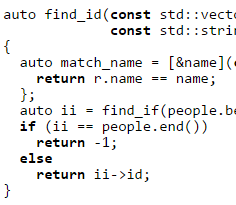The C++14 Standard -- Mark Nelson

The C++14 Standard
by Mark Nelson
From the article:
Voting on the C++14 standard was completed in August, and all that remains before we can say it is officially complete is publication by the ISO. In this article, I will visit the high points of the new standard, demonstrating how the upcoming changes will affect the way you program, particularly when using the idioms and paradigms of Modern C++.
The committee seems intent on keeping the standards process in a higher gear than in the past. This means that C++14, having had just three years since the last standard, is a somewhat constrained release. Far from being disappointing, this is a boon for programmers because it means implementers have been able to push out compliance with the new features in real time. Yes, you can start using C++14 features today — nearly all of them if you are flexible on your tool chain...

 Here's a recent series that just got a new instalment today: It introduces template basics in a nicely explained and accessible way suitable for a gentle introduction, and then going on to progressively help the reader develop stronger template muscles.
Here's a recent series that just got a new instalment today: It introduces template basics in a nicely explained and accessible way suitable for a gentle introduction, and then going on to progressively help the reader develop stronger template muscles. Recently on the Spot blog:
Recently on the Spot blog: Korban's C++11/14 feature overview book now has a Clang edition, in addition to VS2013 and GCC:
Korban's C++11/14 feature overview book now has a Clang edition, in addition to VS2013 and GCC: